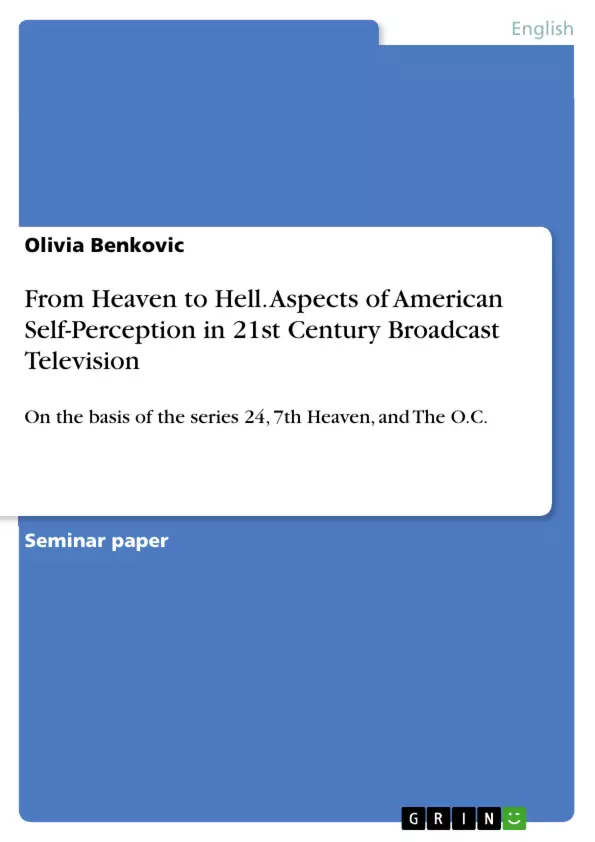21st century American broadcast television series are, of course, works of fiction and thus not subject to an accurate depiction of American reality. However, regardless of its fictional elements, every series conveys values and ideals which reflect real-life value propositions that are essential to American identity in the 21st century. Furthermore, the key elements of American self-perception can be inferred by examining the self-portrayal of Americans in American television series.
Therefore, this paper seeks to inquire how central aspects of American self-perception are addressed in various successful television series and whether traditional American values have been preserved. It will focus on the following three series: "24", "7th Heaven", and "The O.C.", as each of them is exemplary for a different facet of American self-perception. Crime drama series "24" provides a detailed discourse on exceptionalism and the role it plays with regard to patriotism as well as an elaborate account of the discrepancy between the two different faces of America. Family drama series "7th Heaven" draws on Puritan values and emphasizes their applicability in the United States of the 21st century. Teenage drama series "The O.C." addresses the preservation of a class system and class divisions in modern-day American society as opposed to the notion of classlessness.
Inhaltsverzeichnis (Table of Contents)
- Introduction
- 24: Racing Against the Clock
- 2.1 Plot Synopsis
- 2.2 Aspects of American Self-Perception Conveyed by 24
- 2.2.1 Exceptionalism as a Means to Justify Patriotism
- 2.2.2 Portrayal of the "Two Americas" (Fulbright)
- 2.3 Critical Reception
- 7th Heaven: Punishment Is Not Always Bad ("Who Nose")
- 3.1 Plot Synopsis
- 3.2 Aspects of American Self-Perception Conveyed by 7th Heaven
- 3.2.1 Strict Morality as a Key Element for Happiness
- 3.2.2 Responsibility of Wealth
- 3.2.3 The Importance of Education and Hard Work
- 3.3 Critical Reception
- The O.C.: "What I Like About Rich Kids? Nothing!" ("Premiere")
- 4.1 Plot Synopsis
- 4.2 Aspects of American Self-Perception Conveyed by The O.C.
- 4.2.1 The Importance of Class and Class Markers
- 4.2.2 Equality as a Prerequisite for the American Dream
- 4.3 Critical Reception
Zielsetzung und Themenschwerpunkte (Objectives and Key Themes)
This paper explores how American broadcast television series, despite their fictional nature, convey values and ideals that reflect real-life value propositions essential to American identity in the 21st century. By analyzing the self-portrayal of Americans in these series, the paper seeks to understand how central aspects of American self-perception are addressed and whether traditional American values have been preserved. The following three series, 24, 7th Heaven, and The O.C., are examined as each embodies a different facet of American self-perception.- American Exceptionalism and Patriotism
- The "Two Americas" and Social Discrepancies
- Puritan Values and Modern American Society
- Class System and Class Divisions in Contemporary America
- The American Dream and Equality
Zusammenfassung der Kapitel (Chapter Summaries)
24: Racing Against the Clock
The chapter explores the crime drama series 24, focusing on its real-time narrative format and its portrayal of American patriotism. It examines the series' depiction of American exceptionalism, particularly through the character of Jack Bauer and his willingness to violate moral standards in the name of national security. The chapter also examines the series' portrayal of the "two Americas", referencing Senator J. William Fulbright's observations on the discrepancies within American society.7th Heaven: Punishment Is Not Always Bad ("Who Nose")
This chapter analyzes the family drama series 7th Heaven, focusing on its depiction of Puritan values and their relevance in contemporary American society. It explores how the series emphasizes strict morality as a key element for happiness, the responsibility of wealth, and the importance of education and hard work. The chapter also examines the series' critical reception.The O.C.: "What I Like About Rich Kids? Nothing!" ("Premiere")
The chapter investigates the teenage drama series The O.C., analyzing its portrayal of class systems and class divisions in modern American society. It examines the series' depiction of the importance of class markers and its exploration of the American dream in the context of social equality. The chapter also discusses the series' critical reception.Schlüsselwörter (Keywords)
This paper focuses on American broadcast television series, 21st century American self-perception, patriotism, exceptionalism, Puritan values, class system, American dream, social equality, and critical reception. The analysis highlights key concepts such as the "two Americas," moral justification for extreme actions, responsibility of wealth, and the influence of class on achieving the American dream.Frequently Asked Questions
How do TV series reflect American identity?
Even though they are fictional, series convey real-life values, ideals, and social structures that are essential to American self-perception and identity in the 21st century.
What does the series "24" say about American exceptionalism?
The series "24" uses the concept of exceptionalism to justify extreme measures and patriotism in the name of national security, often through the character of Jack Bauer.
Which values are emphasized in "7th Heaven"?
"7th Heaven" focuses on traditional Puritan values, such as strict morality, hard work, the importance of education, and the social responsibility that comes with wealth.
How is social class portrayed in "The O.C."?
The series addresses the existence of a rigid class system and social divisions in modern America, contrasting with the ideal of a classless society and the American Dream.
What is the concept of the "Two Americas"?
Referencing Senator Fulbright, it describes the discrepancy between different social realities and moral standards within the United States, a theme explored in the crime drama "24".
- Citar trabajo
- Olivia Benkovic (Autor), 2013, From Heaven to Hell. Aspects of American Self-Perception in 21st Century Broadcast Television, Múnich, GRIN Verlag, https://www.grin.com/document/289080



